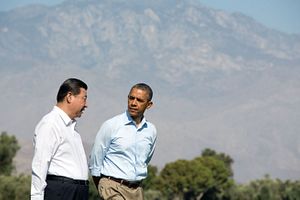In the late 1990s, former President Jiang Zemin liked to talk of China entering a two-decade era of “strategic opportunity” — a period when China could become a middle income country while continuing the Deng-ist strategy of building up its capacity and strengthening its economy during the era of American hegemony. During this period, China would be low profile, largely free of global leadership responsibilities, and able to plead its status as a poor, developing power focused on solving its own problems as a reason to sidestep heavy diplomatic duties beyond its borders.
Three-quarters of the way into this era of “strategic opportunity,” and we might argue that this period has already come to an end. Economically and geopolitically, the China of Xi Jinping increasingly talks and acts like an emerging super power. Xi, with his grand narratives of a “new model of great power relations” for the U.S. and China, and a “New Silk Road” for most of the rest of the planet, seems to have the look, and tone, of someone willing to stand more on the global stage and get attention.
It seems like the “era of strategic opportunity,” where the onus was on internal issues and keeping a low profile, has been replaced by a China where, as Xi puts it in a recently collected edition of speeches (The Governance of China), its inward and outward context are intimately linked. For China, the pressure is now on finding “holistic” solutions where it often proactively takes the lead on the global stage and wants to be listened to.
Even so, it still makes sense to think along the lines of smaller strategic opportunities. One date in particular stands out – that of only a year hence, when there are perfectly good reasons to predict that the global and regional atmosphere for China will grow a little frostier and less benign. China needs to grab its chances now before they disappear.
The first reason 2016 will be a trial for China is the U.S. presidential election. For all his talk of “pivots” and rebalancing, President Obama has been a good president for China. He has been read as weak and overstretched and was treated with staggering disdain during his first visit to Beijing in 2009. Under Obama’s watch, we witnessed the rise of an assertive, pushy China that has been increasingly able to call the shots, at least in its neighborhood. Now, this might be a very unfair reading. Historically, Obama’s achievements in terms of doing a climate change deal late last year with the Chinese might go down as a far-sighted move, bringing benefits years from now. But the perception amongst many in Beijing and Washington is that he has been weak (and in diplomacy, perception is usually 99 percent of what matters).
In 2016, we might well see Hilary Clinton move to the White House. Her image, in China, is not that of someone who is weak. The Chinese media reception for her various visits to the People’s Republic, from the time she attended the U.N. conference on women in 1995 up to her period as secretary of state, has been half-admiring, half-apprehensive. She is seen as someone who is tough and frighteningly ambitious. Chinese analysts and policy makers may well already be starting to fear what the complexion of a Clinton White House focused from day one on reaffirming the United States’ prime role in the world might mean for them.
The same year will all bring a presidential elections in Taiwan. Like Obama, but for very different reasons, incumbent Ma Ying-jeou of the Kuomintang (KMT) has been a good ally for Beijing. He promoted economic closeness and political carefulness, significantly reducing the cross-strait tensions that existed in the eight years under Chen Shui-bian before Ma’s election in 2008. But this has brought him some of the worst approval ratings a Taiwanese leader has ever seen. 2016 might not be a walkover for the opposition Democratic Progressive Party (DPP), but it is theirs to lose. And the DPP policy toward the mainland would be far less accommodating than that of the KMT.
In the space of a few months in 2016, therefore, Beijing will see the leadership of two of its key partners change, with the real possibility that this will bring about a more confrontational environment. Xi Jinping has proved adept at coining new phrases to capture significant interest for China. But 2016, far from being a furthering of the China Dream, could turn out to be the start of a nightmare. There is a little over 18 months of a small strategic opportunity For Xi to achieve as much as possible with Presidents Obama and Ma before they disappear. In 2015 and 2016 we may well see some unexpected and surprising moves as the Chinese side tries to capitalize on this. The question is whether Obama and Ma are in the mood to respond to these overtures, or whether their reserves of imagination and patience on Chinese matters are long since used up.

































